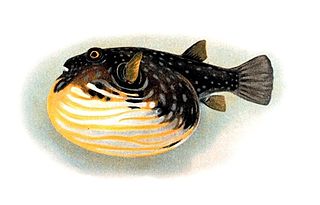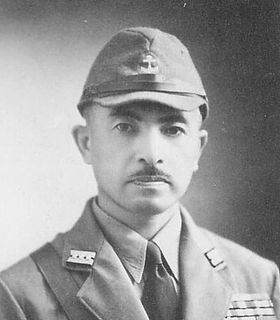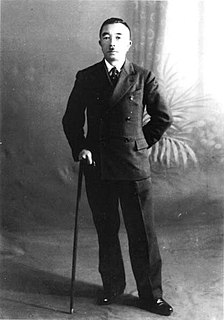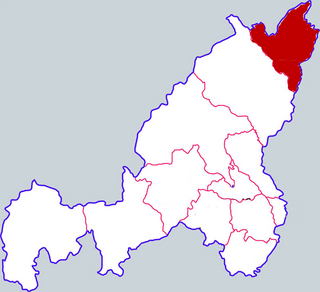
The Tetraodontidae are a family of primarily marine and estuarine fish of the order Tetraodontiformes. The family includes many familiar species which are variously called pufferfish, puffers, balloonfish, blowfish, blowies, bubblefish, globefish, swellfish, toadfish, toadies, honey toads, sugar toads, and sea squab. They are morphologically similar to the closely related porcupinefish, which have large external spines. The scientific name refers to the four large teeth, fused into an upper and lower plate, which are used for crushing the hard shells of crustaceans and mollusks, their natural prey.

Takifugu is a genus of pufferfish, often better known by the Japanese name fugu. There are 25 species belonging to the genus Takifugu and most of these are native to salt and brackish waters of the northwest Pacific, but a few species are found in freshwater of Asia or more widely in the Indo-Pacific region. Their diet consists mostly of algae, molluscs, invertebrates and sometimes crustaceans. The fish defend themselves by inflating their bodies to several times normal size and by poisoning their predators. These defenses allow the fish to actively explore their environment without much fear of being attacked.
Sashimi bōchō, literally "sashimi knife" is a type of long, thin knife used in Japanese cuisine to prepare sashimi. Types of sashimi bōchō include tako hiki, yanagi ba, and fugu hiki.
Bernard "Bernie" Stolar is an American businessman.

Captain Koreshige Inuzuka was the head of the Japanese Imperial Navy's Advisory Bureau on Jewish Affairs from March 1939 until April 1942. Unlike his Imperial Japanese Army counterpart, Colonel Yasue Norihiro, he held to an anti-Semitic ideology, believing strongly in the Protocols of the Elders of Zion; but these beliefs led him to think that attracting Jews to settle in Japanese-controlled Asia was in the Empire of Japan's best interests.

The Shanghai Fugu Agreement is a fictional document and was referred to in a successful 1984 political prank played on the Social Democrats in the German state of Hesse.

Carl Johan Freer is a Swedish businessman and technology entrepreneur primarily known for founding the American company Tiger Telematics, which created the handheld game console Gizmondo. Freer is also the founder of Singapore-based medical-device company, Aluminaid and co-author of several patents.

Israeli–Japanese relations began on May 15, 1952, when Japan recognized Israel and an Israeli legation opened in Tokyo. In 1954 Japan's ambassador to Turkey assumed the additional role of minister to Israel. In 1955 a Japanese legation with a Minister Plenipotentiary opened in Tel Aviv. In 1963, relations were upgraded to Embassy level, and have remained on that level since then. Japan's trade relations with Arab League members and most Muslim-majority countries have taken a precedence over those with Israel. However, due to the declining price of oil in early 2015, as well as internal political shifting in Japan, the two nations are seeking increased research, economic and cultural ties, particularly in the area of tech start-ups and defense. Today ties between Israel and Japan were strengthened significantly, with many mutual investment between the two nations. Japanese prime minister Shinzo Abe visited Israel twice – once in 2015 and a second time in 2018.

Shimonoseki is a city located in Yamaguchi Prefecture, Japan. Shimonoseki is the biggest city in Yamaguchi Prefecture. It is at the southwestern tip of Honshu, facing the Tsushima Strait and also Kitakyushu across the Kanmon Straits.

Norihiro Yasue was an Imperial Japanese Army colonel who played a crucial role in the so-called Fugu Plan, in which Jews were rescued from Europe and brought to Japanese-occupied territories during World War II. He was known as one of Japan’s "Jewish experts", along with Captain Koreshige Inuzuka.

Takifugu rubripes, commonly known as the Japanese puffer, Tiger puffer, or torafugu, is a pufferfish in the genus Takifugu. It is distinguished by a very small genome that has been fully sequenced because of its use as a model species and is in widespread use as a reference in genomics.
Vibrio alginolyticus is a Gram-negative marine bacterium. It is medically important since it causes otitis and wound infection. It is also present in the bodies of animals such as pufferfish, where it is responsible for the production of the potent neurotoxin, tetrodotoxin.

Zohar is an album by the Mystic Fugu Orchestra (John Zorn and Yamataka Eye who perform a range of music inspired by historical recordings of ancient Judaica. To simulate the "antiquity" of these recordings, a heavy layer of surface noise was overlaid on the music to represent the playing quality of a 78 rpm gramophone record.
Errentai, also known as Errenban, Dawanyi'er, Shuangwanyi'er, and Bengbeng, is a genre of Chinese opera performed by two singers. It is popular in Fugu County and Shenmu County in northern Shaanxi, Hequ County in northwestern Shanxi, Kangbao County in northwestern Hebei, and areas near Baotou, Hohhot, and the Ordos Plateau in Inner Mongolia.

Fugu chiri is a pufferfish soup. It is also known as tetchiri.

Fantasia is a 2004 Hong Kong comedy film produced, written and directed by Wai Ka-fai and starring Cecilia Cheung, Sean Lau, Louis Koo, Jordan Chan, Francis Ng and Christy Chung. The film is a homage to classic Hong Kong comedy films which starred the Hui Brothers, Michael Hui, Samuel Hui and Ricky Hui, particularly the 1976 film, The Private Eyes.












